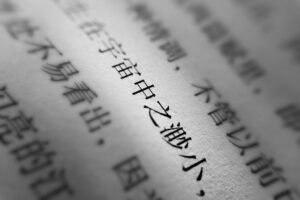Are you looking to take your Mandarin skills to the next level? Want to challenge your pronunciation abilities while having fun? Look no further than Chinese tongue twisters! These captivating word games are not only popular in China, but also serve as excellent exercises for advanced learners. But what makes Chinese tongue twisters so special? Let’s find out!
Table of Contents
ToggleKey Takeaways:
- Chinese tongue twisters are challenging language exercises that help improve pronunciation skills.
- They provide a fun way to learn Mandarin and engage with the language.
- Tongue twisters have cultural significance in the Chinese language.
- They offer advanced Mandarin learners a unique way to enhance their language abilities.
- By embracing the challenge of tongue twisters, learners can continue to progress in their Mandarin journey.
Understanding Chinese Tongue Twisters
Welcome to the captivating world of Chinese tongue twisters! These linguistic gems have been a part of Chinese culture for centuries and continue to intrigue language enthusiasts today. Tongue twisters, or as they are known in Mandarin, “绕口令” (rào kǒu lìng), are popular exercises used to improve pronunciation skills and provide a fun way to learn the language.
So, what exactly are Chinese tongue twisters? These are phrases or sentences that consist of similar sounds or tones, making them challenging to pronounce quickly and accurately. The aim is to repeat the tongue twister multiple times without stumbling over the words. It’s like a linguistic roller coaster that tests your dexterity and finesse with the Mandarin language.
Tongue twisters hold great cultural significance in the Chinese language. They are considered a traditional art form and are often performed during festivals, gatherings, or as a form of entertainment. The ability to master tongue twisters is seen as a demonstration of language prowess and is highly admired.
Now, let’s take a look at some popular Chinese tongue twisters:
一只鱼说:“你为什么不说话?”另一只鱼回答:“因为我说话,那么你就会下钩!”
“Yī zhī yú shuō: ‘Nǐ wèi shénme bù shuōhuà?’ Lìng yī zhī yú huídá: ‘Yīnwèi wǒ shuōhuà, nàme nǐ jiù huì xià gōu!'”
Translation: One fish said, “Why aren’t you talking?” The other fish replied, “Because if I talk, then you’ll get hooked!”
四是四,十是十,十四是十四,四十是四十,十四不是四十,四十不是十四。
“Sì shì sì, shí shì shí, shísì shì shísì, sìshí shì sìshí, shísì bù shì sìshí, sìshí bù shì shísì.”
Translation: Four is four, ten is ten, fourteen is fourteen, forty is forty, fourteen is not forty, and forty is not fourteen.
These tongue twisters showcase the intricacies of the Mandarin language, with their repetitive sounds and tones. They challenge learners to develop their pronunciation skills and improve their fluency.
By understanding the background and purpose of Chinese tongue twisters, learners can fully appreciate their value in language learning. So, let’s dive deeper into the realm of tongue twisters and explore how they can help you in your Mandarin journey.
Mastering Mandarin Pronunciation
When it comes to learning Mandarin, pronunciation plays a crucial role in effectively conveying meaning and understanding. That’s where pronunciation practice comes in. By engaging in targeted exercises that focus on the sounds of the language, learners can improve their pronunciation skills and enhance their overall Mandarin proficiency. One particularly effective way to practice pronunciation is through the use of tongue twisters.
Tongue twisters are challenging word combinations or phrases that require precise articulation and rapid speech. They are not only a fun language exercise but also a valuable tool for mastering Mandarin pronunciation. By repeating tongue twisters and paying close attention to the sounds and tones of each word, learners can train their mouth muscles to produce accurate Mandarin sounds.
To make the most out of pronunciation practice using tongue twisters, here are a few tips and techniques:
- Start slow and gradually increase speed: Begin by pronouncing the tongue twister slowly, focusing on each sound. As you become more comfortable, increase your speed while maintaining clarity.
- Pay attention to tones: Mandarin is a tonal language, meaning that the tone of a word can change its meaning. Practice matching the correct tone for each word in the tongue twister.
- Break down words: If a tongue twister includes words or sounds that are particularly challenging, break them down into smaller parts and practice those segments individually.
- Record and listen: Record yourself reciting the tongue twister and listen to the recording. Compare it to a native speaker’s pronunciation and identify areas for improvement.
To further enhance your pronunciation skills and take your Mandarin proficiency to the next level, here are some advanced exercises you can try:
- Shadowing: Listen to a native speaker or audio recording of Mandarin and repeat the words and sentences immediately after hearing them. Focus on mimicking their pronunciation and intonation.
- Tone drills: Practice pronouncing Mandarin tones by repeating a series of syllables with different tones. This helps develop a clear and accurate understanding of tone variations.
- Minimal pairs: Work with a tutor or language partner to practice distinguishing between similar sounds or tones that may cause confusion for non-native speakers.
By incorporating these pronunciation practice techniques and advanced Mandarin exercises into your language learning routine, you’ll be well on your way to mastering Mandarin pronunciation. Remember, consistent practice and patience are key to achieving proficiency in any language.
| Benefits of Pronunciation Practice | How to Practice Pronunciation |
|---|---|
|
|
Fun with Chinese Tongue Twisters
Chinese tongue twisters are not just challenging language exercises; they also provide a fun way to engage with the language. These entertaining phrases not only test your pronunciation abilities but also bring a playful element to your language learning journey. Let’s explore some popular tongue twisters that will have you twisting your tongue in laughter.
Entertaining Tongue Twisters
“四是四,十是十,十四是十四,四十是四十。” (Sì shì sì, shí shì shí, shísì shì shísì, sìshí shì sìshí)
This tongue twister challenges the distinction between the numbers four (四, sì) and ten (十, shí) in Mandarin. Can you say it without stumbling over the similar sounds?
Another popular tongue twister is:
“四十四困倦,喝四十四杯酒。” (Sìshísì kùnjuàn, hē sìshísì bēi jiǔ)
This tongue twister tests your speed and clarity as you try to say the phrase that means “Forty-four is tired and drinks forty-four glasses of wine.”
Popular Word Games and Language Learning Activities
Want to have even more fun with tongue twisters? Incorporate them into popular word games and language learning activities. Here are a few ideas to get you started:
- Create a tongue twister challenge with your friends or classmates. Take turns saying challenging tongue twisters and see who can pronounce them the fastest and most accurately.
- Play a memory game where you recite a tongue twister and the next person has to repeat it and add a new one. The game continues until someone forgets a tongue twister.
- Challenge yourself to write your own tongue twisters. Get creative and come up with phrases that push your pronunciation skills to the limit.
By incorporating tongue twisters into these interactive language learning games, you’ll not only have a great time but also enhance your Mandarin skills.
| Benefits of Fun Chinese Tongue Twisters | Why They’re Popular |
|---|---|
| 1. Improve pronunciation skills | 1. They provide a unique challenge |
| 2. Enhance language learning experience | 2. They add an element of fun to language learning |
| 3. Boost confidence in speaking Mandarin | 3. They help break the monotony of traditional learning methods |
| 4. Foster cultural appreciation | 4. They showcase the rich cultural heritage of tongue twisters in Chinese tradition |
Get ready to have a blast with Chinese tongue twisters and experience the joy of learning a new language through playful challenges and engaging word games.
Conclusion
In conclusion, Chinese tongue twisters, also known as Mandarin tongue twisters, are invaluable tools for advanced learners seeking to improve their Mandarin pronunciation skills and enhance their overall language abilities. These tongue twisters not only provide a challenging exercise for learners but also offer a unique and entertaining way to engage with the Chinese language.
By embracing the challenge of tongue twisters, learners can continue their Mandarin journey while having fun along the way. The cultural significance of these tongue twisters adds an extra layer of depth to the learning experience, allowing learners to connect with the rich heritage of the Chinese language.
Whether it’s reciting traditional Chinese tongue twisters or exploring the vibrant world of contemporary Mandarin tongue twisters, learners are sure to benefit from the linguistic workout and the enjoyment it brings. So, add some twist to your language learning and start practicing Chinese tongue twisters today!
FAQ
What are Chinese tongue twisters?
Chinese tongue twisters are phrases or sentences that are challenging to pronounce due to the repetition of similar sounds or difficult combinations of syllables. They are commonly used in language learning to improve pronunciation and have fun with the Chinese language.
Why are Chinese tongue twisters important for advanced learners?
Chinese tongue twisters are important for advanced learners as they help improve pronunciation skills, enhance fluency, and strengthen language comprehension. By practicing tongue twisters, learners can refine their understanding of Mandarin sounds and tones.
How can Chinese tongue twisters help with pronunciation practice?
Chinese tongue twisters provide a focused way to practice specific sounds, tones, and combinations that may be challenging for learners. By repeatedly saying tongue twisters, learners can train their tongues and mouths to produce accurate and natural Mandarin pronunciation.
Can Chinese tongue twisters be used as language learning games?
Yes, Chinese tongue twisters can be used as language learning games. They add an element of fun and challenge to the learning process, helping learners engage with the language in an enjoyable way. Tongue twister games can be played individually or in group settings to create a dynamic and interactive learning environment.
Are there traditional Chinese tongue twisters?
Yes, there are traditional Chinese tongue twisters that have been passed down through generations. These tongue twisters often reflect cultural aspects, historical references, and wordplay unique to Chinese language and culture, providing learners with a deeper insight into the language.
Are there advanced Mandarin tongue twisters for experienced learners?
Yes, there are advanced Mandarin tongue twisters specifically designed for experienced learners. These tongue twisters feature more complex sounds and require a high level of proficiency in pronunciation. They offer an additional challenge for advanced learners looking to further refine their Mandarin skills.
How can I incorporate Chinese tongue twisters into my language learning routine?
You can incorporate Chinese tongue twisters into your language learning routine by setting aside dedicated practice time, repeating the tongue twisters slowly at first, and gradually increasing your speed and accuracy. You can also use language learning apps, online resources, or join language learning communities to explore more tongue twisters and receive feedback on your pronunciation.








